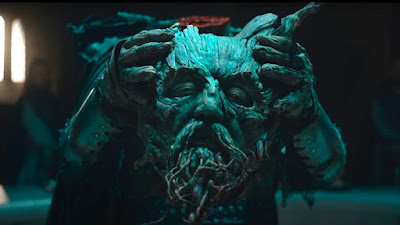How we spend the limited time we have on this Earth was an organising theme of A Ghost Story, where the Affleck-sheet watched on for decades, maybe even centuries, after its vessel's physical demise. The protagonist there was a goner, and so had no choice but to hang around his assigned limbo hoping the universe would right itself. Gawain is very much alive, by contrast, and trying to stay that way. He starts the film fresh-faced, dewy if not outright wet behind the ears, perhaps a little too full of himself, and over the course of his Ye Olde Gappe Year is gradually stripped of his money, vestments and hubris. (One way of approaching this saga: as a rite-of-passage written by someone a good few years down the line, who knew exactly the brick walls of adult responsibility into which this carefree kid was set to run.) Growing ever more confident as a leading man, yet still betraying flickers of the naivety that made some of his early screen appearances so excruciating to behold, Patel certainly looks and fits the part, and if you come here seeking that very modern science known as world-building, have at it: the film's designers have constructed a Middle Ages that occupies the middle ground between Game of Thrones and Hard to Be a God, more mysterious than the former, less murky than the latter, allowing room for conscience, compassion and chivalry besides. The star is the Green Knight himself, notionally embodied by Ralph Ineson, yet conceived as a giant, creaking treetrunk-thing that suggests a Guillermo del Toro makeover of the Jolly Green Giant. There really are elements to marvel at here, not least when the Knight resurfaces in the final reel to claim the grave debt owed to him. "Is this really all there is?," gasps a despairing Gawain as his foe's sword hovers over his neck. Yup: sorry, fella. (Some folk learn it the hard way.)
There is also plenty here that made me go hmmm. In one crucial aspect, remaining loyal and true to the source feels like a limitation: the storytelling is olde-worlde episodic, resulting in a middle hour of questing in which characters come and go within minutes of screen time, some of whom (Barry Keoghan's trickster) leave greater traces than others (Erin Kellyman's St. Winifred). With the possible exception of the punchline, it's also unwaveringly po-faced; I came away realising I'm really more of a Chaucer kind of guy. However weird The Green Knight gets, it's still only boutique-weird, carefully curated and cultivated, lacking the rude energies of, say, Pasolini's Trilogy of Life - which may be why that middle hour feels as listless as it does. We get bogged down in the company of Good King Joel Edgerton, growling through a beard, and an unusually dull Alicia Vikander, as a princess who bears a marked resemblance to the serving wench Gawain is seen boinking as the movie opens. (This is because she, too, is played by Vikander: the dual casting might only have been profound if the actress had any spark about her.) Increasingly I wonder whether certain American filmmakers have decided the only possible alternative to the Marvel-Disney hegemony is to push even further out into the realms of fantasy, to aim specifically for wild-and-woolly territory. The Green Knight is unarguably that, but I still think most sentient cinemagoers are crying out for those entertainments in which complicated grown-ups find themselves in broadly familiar predicaments that don't involve talking foxes. (This, of course, is where TV has re-entered the picture.) We've wound up in a place where storytelling in American movies means either films that do the exact same thing over and over again to reassure an audience of millions, or films that insistently do their own thing for the delight of a niche few. Lowery is probably on the right side of this binary, but there remains a vast kingdom between the two camps, and it's a continued headscratcher that no-one's saddling up and setting out to explore that.
The Green Knight is now showing in selected cinemas, and available to stream via Prime Video.

No comments:
Post a Comment